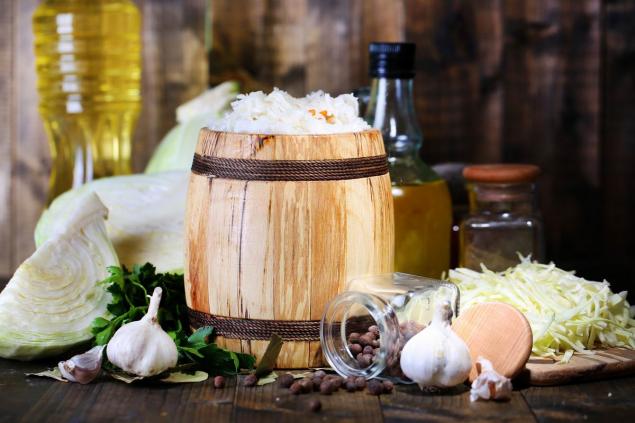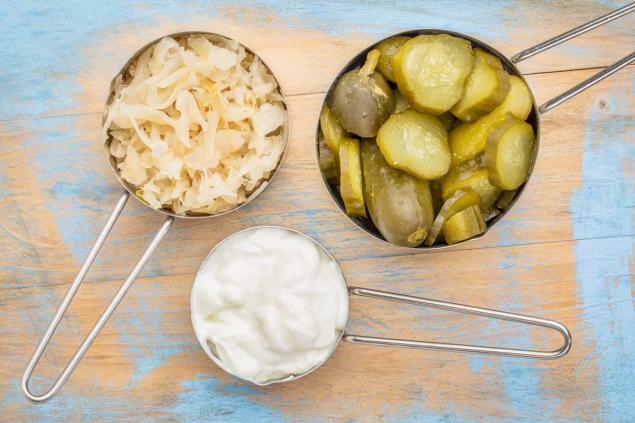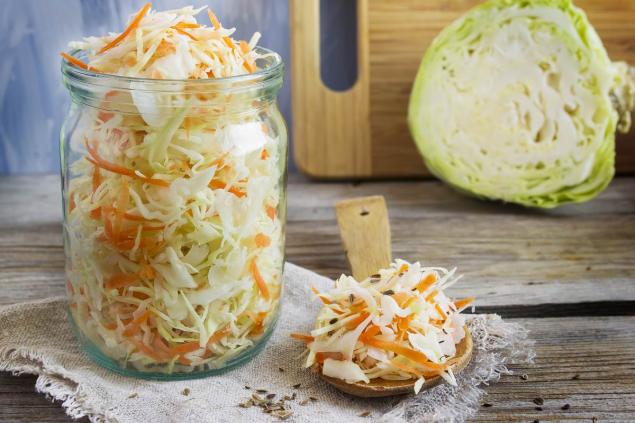171
Why sauerkraut should be eaten daily in winter and summer
The tradition of sauerkraut, as it turned out, is older than the Great Wall of China, but it is perfectly preserved to this day. What is the reason for such an amazing longevity and what is the use of sauerkraut?

"Site" He will try to answer these questions, and at the same time he will tell who should be careful to use a crispy snack, and who it is time to abandon it at all.
What is useful sauerkraut Improves digestion Our ancestors did not know about the beneficial bacteria that live in ready-made home fermentations. In the absence of refrigerators, the fermentation process was used primarily to preserve food between harvests.

Today, we know that during sauerkraut, bacteria convert sugar into lactic acid, which improves the intestinal microflora and is very useful for people with a slow metabolism. At the same time, the remaining substances in the vegetable are not destroyed, and its nutritional value even increases as it is stored.

Like other fermented foods, sauerkraut helps the body better absorb nutrients.

Fiber in sauerkraut accelerates the removal of toxins from the body. Brine reduces sugar levels, heals the intestinal walls and relieves hangovers.
Beneficial bacteria living in the intestines of a healthy person do a lot of useful work: they help digest food, protect the intestines from harmful substances, synthesize vitamins, regulate water-salt balance.

It’s hard to believe, but it is these microscopic assistants that we owe 80% of our immunity. And to maintain their population, our body needs probiotics - live microorganisms, the best natural source of which is sauerkraut.
Probiotics in sauerkraut directly affect the state of the intestines and the production of antibodies to bad bacteria. Thus, a fermented vegetable becomes a catalyst for powerful protection against most diseases.
Sauerkraut is rich in pectin, calcium and iron. Only half a glass of this dish covers our daily need for vitamin K, which strengthens hair and teeth.
But it is especially important as a source of vitamin C available at any time of the year.

Interestingly, ordinary cabbage is not a record holder for the content of any vitamins. Vitamin C in the original cabbage is not more than 30-40 mg per 100 grams of weight.
However, when fermented, the composition of the product changes significantly. Fibers are partially destroyed, useful compounds are released and their digestibility increases.
It turns out that the relative content of vitamin C and its availability in sauerkraut is higher than in winter cabbage, which we usually buy in the store.
The lack of fat, beneficial effect on digestion and low calorie (20 kcal per 100 grams) make sauerkraut one of the best products for those who seek to lose weight. Even without much limiting yourself in the amount of food, with its help you can lose weight by a couple of pounds in just a few days.

List useful bonuses from the use of sauerkraut can be endless. But it is important to remember that purchased cabbage contains a large amount of sugar and vinegar.

Therefore, it is best to engage in independent preparation of crispy delicacies according to our recipes.
Who can't eat sauerkraut?
Now you know how useful sauerkraut is. From it you can prepare salads, soups, fillings for cakes. Or just fill it with oil and serve it on the table. Juicy, crispy and with a pleasant sour cabbage to you, dear reader!

"Site" He will try to answer these questions, and at the same time he will tell who should be careful to use a crispy snack, and who it is time to abandon it at all.
What is useful sauerkraut Improves digestion Our ancestors did not know about the beneficial bacteria that live in ready-made home fermentations. In the absence of refrigerators, the fermentation process was used primarily to preserve food between harvests.

Today, we know that during sauerkraut, bacteria convert sugar into lactic acid, which improves the intestinal microflora and is very useful for people with a slow metabolism. At the same time, the remaining substances in the vegetable are not destroyed, and its nutritional value even increases as it is stored.

Like other fermented foods, sauerkraut helps the body better absorb nutrients.

Fiber in sauerkraut accelerates the removal of toxins from the body. Brine reduces sugar levels, heals the intestinal walls and relieves hangovers.
Beneficial bacteria living in the intestines of a healthy person do a lot of useful work: they help digest food, protect the intestines from harmful substances, synthesize vitamins, regulate water-salt balance.

It’s hard to believe, but it is these microscopic assistants that we owe 80% of our immunity. And to maintain their population, our body needs probiotics - live microorganisms, the best natural source of which is sauerkraut.
Probiotics in sauerkraut directly affect the state of the intestines and the production of antibodies to bad bacteria. Thus, a fermented vegetable becomes a catalyst for powerful protection against most diseases.
Sauerkraut is rich in pectin, calcium and iron. Only half a glass of this dish covers our daily need for vitamin K, which strengthens hair and teeth.
But it is especially important as a source of vitamin C available at any time of the year.

Interestingly, ordinary cabbage is not a record holder for the content of any vitamins. Vitamin C in the original cabbage is not more than 30-40 mg per 100 grams of weight.
However, when fermented, the composition of the product changes significantly. Fibers are partially destroyed, useful compounds are released and their digestibility increases.
It turns out that the relative content of vitamin C and its availability in sauerkraut is higher than in winter cabbage, which we usually buy in the store.
The lack of fat, beneficial effect on digestion and low calorie (20 kcal per 100 grams) make sauerkraut one of the best products for those who seek to lose weight. Even without much limiting yourself in the amount of food, with its help you can lose weight by a couple of pounds in just a few days.

List useful bonuses from the use of sauerkraut can be endless. But it is important to remember that purchased cabbage contains a large amount of sugar and vinegar.

Therefore, it is best to engage in independent preparation of crispy delicacies according to our recipes.
Who can't eat sauerkraut?
- Sauerkraut in large quantities should not be consumed by people with kidney diseases. The salt that is used for sourdough will delay the release of fluid and this will increase the load on the kidneys.
- To completely abandon sour cabbage will have people with an increased acidic environment, ulcers, diseases of the liver and pancreas.
- The fermented vegetable contains fermentation products, which in combination with fiber can cause increased gas formation.
- It is not recommended to eat more than 150 grams of sauerkraut a day, and children under 3 years old should not give it at all.
Now you know how useful sauerkraut is. From it you can prepare salads, soups, fillings for cakes. Or just fill it with oil and serve it on the table. Juicy, crispy and with a pleasant sour cabbage to you, dear reader!























